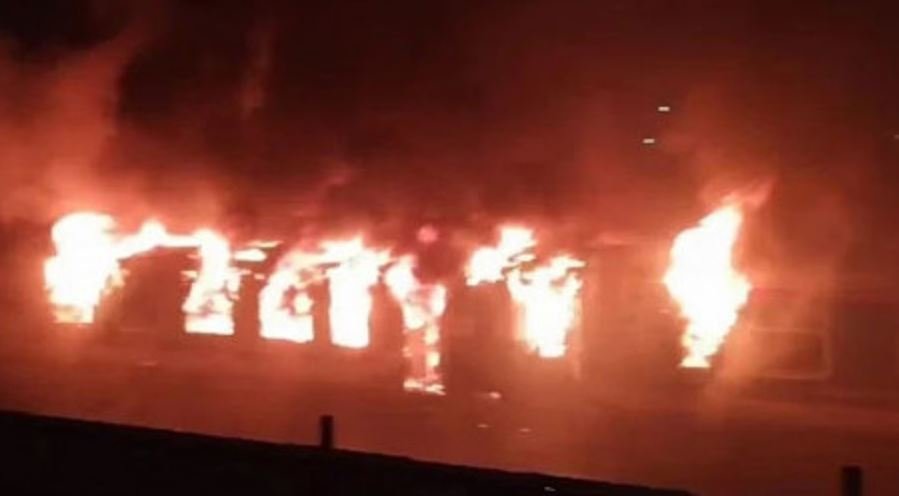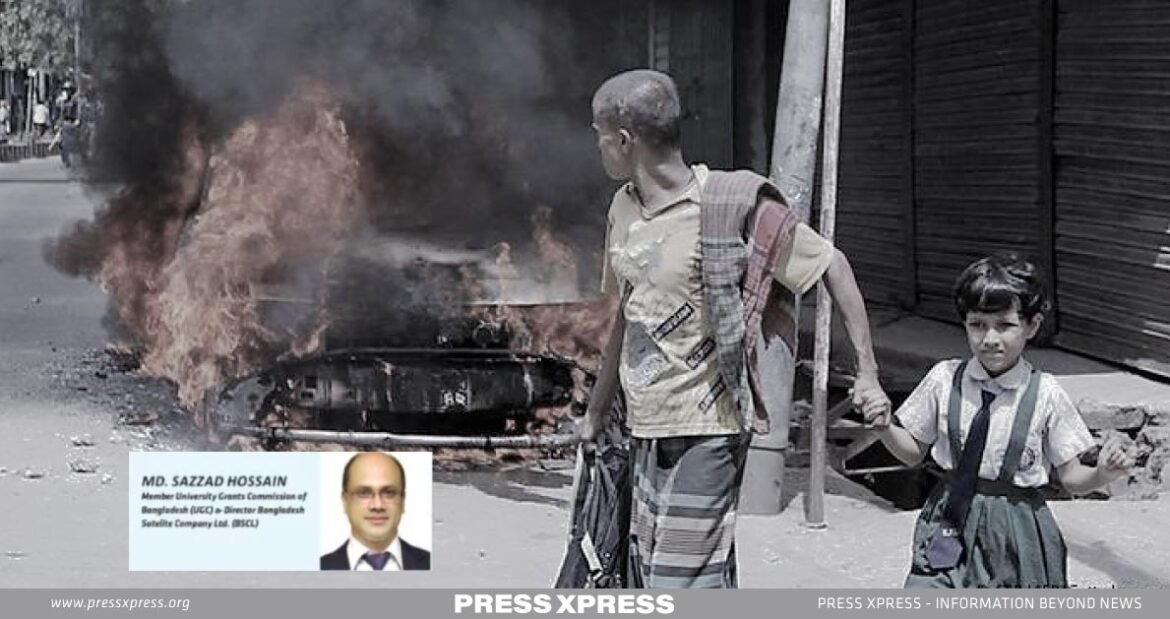The Bangladesh Nationalist Party (BNP) emerged as a significant political force in the tumultuous political landscape of Bangladesh. The party was officially founded on September 1, 1978, by General Ziaur Rahman, a former military officer and the de facto ruler of Bangladesh after the assassination of the country’s founding leader, Bangabandhu Sheikh Mujibur Rahman, in 1975. In fact, BNP’s formation occurred against the backdrop of martial law, with General Ziaur Rahman serving as the Chief Martial Law Administrator. The party was established as a centre-right political organization, positioning itself as an alternative to the socialist policies of the preceding Awami League government. Afterwards, the military-backed government faced criticism for its suppression of political dissent and restrictions on civil liberties. The party went through various phases, with changes in leadership and evolving political dynamics, contributing to its role in shaping the country’s political landscape. However, its history is mostly marked by controversy, raising questions about its commitment to democracy, human rights, and national unity.
A Tarnished Past:
During its first time in office (1978–1981), the BNP was accused of restricting civil freedoms, violating the constitution, and stifling resistance voices. The BNP has been under criticism for allegedly introducing the ‘Indemnity ordinance’ in 1975, which gave impunity to those responsible for the assassination of Bangabandhu Sheikh Mujibur Rahman and his family. This ordinance also effectively shielded those accused of war crimes from prosecution, angering many Bangladeshis who felt justice was denied. Moreover, Ziaur Rahman rehabilitated several individuals who had collaborated with the Pakistani Army during the war, integrating them back into the Bangladeshi military and bureaucracy. This move drew criticism from those who saw it as a betrayal of the war’s ideals and a reward for those who had opposed Bangladesh’s independence. In addition, Ziaur Rahman released several individuals who were initially arrested and charged with involvement in the assassination and posted in different posts. Apart from this, Ziaur Rahman’s successor, General H. M. Ershad, established a military regime that lasted eight years (1982-1990). While the BNP officially opposed the coup, its role in enabling the military regime remains a critical point of debate.
Relationship between BNP and Pro-Pakistani Parties:
The Bangladesh Nationalist Party (BNP) and Jamaat-e-Islami, a party accused of committing war crimes during the 1971 Liberation War, have maintained a complex and controversial relationship for decades. At present, these two parties are not officially in the 20-party alliance, however, Jamaat-e-Islami is declaring their protest plan against Awami League led government following BNP. BNP and Jamaat-e-Islami have had political alliances at various points in Bangladesh’s history. The collaboration between the two parties has often cantered around shared goals, including opposition to the policies of the Awami League and alignment on issues related to political principles. Jamaat-e-Islami, being a radical religious party, has found common ground with BNP on matters related to religion and national identity. This alliance has significantly impacted the image of the BNP both internationally and domestically, raising concerns about its commitment to democratic values and spirit of Liberation War. Ziaur Rahman, the founder of the BNP, forged an alliance with Jamaat-e-Islami in the 1970s to consolidate his power and broaden his political base. This move was justified as a strategic necessity to counterbalance the influence of the Awami League and other leftist forces. But international Bangladeshi diaspora communities and human rights organisations denounced and protested this alliance from the beginning. BNP’s alignment with Jamaat-e-Islami has been a factor in shaping how the party is perceived by foreign governments and international observers, impacting its diplomatic standing. Furthermore, this alliance has also significantly damaged the BNP’s image within Bangladesh. A large section of the population perceives Jamaat-e-Islami as a party opposed to the country’s independence and secular values. This perception has alienated many potential voters from the BNP. While the alliance provides the BNP with a temporary boost in electoral support, it ultimately comes at a high cost. The international condemnation and the alienation of a significant section of the population have significantly weakened the party’s position and eroded its credibility.
BNP’s Heinous Activities:
In 1996 and 2009, the BNP has played a crucial role as the main opposition party. However, its political activities have been marred by boycotts of different local and parliamentary elections, walkouts from parliament, street violence, misuse of caretaker government system, and allegations of electoral manipulation. These activities have eroded public trust in the party’s commitment to democratic values and national well-being. The party’s leader, Khaleda Zia, has faced numerous corruption charges, including the controversial Zia Orphanage Trust scandal. Her son, Tarique Rahman, has also been embroiled in corruption cases. Additionally, the BNP is held accountable for mismanaging the economy and energy sector during their rule, implying that the nation’s economic circumstances deteriorated while they were in power in 1991 and 2001.

The grenade assault on an Awami League meeting in Dhaka on August 21, 2004, left many injured and several dead, including the honourable prime minister at the time, Sheikh Hasina. The BNP has been charged by the Awami League with involvement or complicity in this incident. In addition, during the second term of BNP (2001-2006), Bangladesh experienced the rise of extremist groups, such as- Jamaat-ul-Mujahideen Bangladesh (JMB), Harakat ul-Jihad al-Islami (HuJI) and others, who tried to transform Bangladesh like Afghanistan. It posed a major security challenge for the nation with numerous bombing and killings. For example, the JMB alone carried out over 200 bombings, targeting courts, police stations, cultural venues, and even diplomatic missions. They were also involved in using Bangladesh as route for delivering illegal weapons to Indian terrorist groups. Finally, the Awami League has pointed to incidents of violence and criminal activities, such as arson attacks on buses and educational institutions in 2014 has attributed these actions to BNP and its political allies. After the chaos on 28 October 2023 created by BNP members, fire arson and destructions of public properties are going on till today. They are even trying to dismiss the upcoming parliamentary election with international conspiracy and lobbying.
Tarique Rahman Factor:
Tarique Rahman, the son of former Prime Minister Khaleda Zia and senior vice-chairman of the Bangladesh Nationalist Party (BNP), remains a highly influential and controversial figure. His actions have significantly impacted the party’s present vulnerable situation and continue to be a source of debate in Bangladesh’s political landscape. Critics accuse Tarique Rahman of exercising undue influence within the party, adopting an authoritarian approach that stifles dissent and discourages open discussions. This has led to internal divisions and disillusionment among some BNP members. Tarique Rahman has been associated with various controversial decisions made by the BNP leadership, including boycotts of national elections and destruction of public properties in the name of protestation. Tarique Rahman has faced numerous allegations of corruption during his time as an influential figure within the BNP and the government (2001-2006). At that time, he served as the Senior Joint Secretary General of BNP and was appointed as the Senior Political Secretary to his mother, Prime Minister Khaleda Zia. He was accused of involvement in various corrupt practices, including bribery and extortion. The charges ranged from amassing wealth through illegal means to influencing government decisions for personal gain. These allegations led to a series of legal actions and investigations against Tarique Rahman. He was accused of laundering money through a Singapore bank account, receiving bribes in exchange for awarding government contracts. In addition, Tarique Rahaman and 18 others were sentenced to life in prison on charges of killing through criminal conspiracy in ‘21 August grenade attack case’ verdict. Tarique Rahman’s self-imposed exile in London since 2008 has created a leadership vacuum within the BNP, leaving the party directionless and lacking a clear vision for the future. This has further weakened the party’s position and hampered its ability to compete effectively in elections.
The Failure of Top Leadership of BNP:
The Bangladesh Nationalist Party (BNP) has faced challenges and criticism over the years, and some observers attribute part of its weakened position to factors related to its top leadership. Periods of leadership vacuum, such as during the imprisonment or exile of key leaders, have left the party without clear direction. This lack of consistent leadership has hindered the BNP’s ability to formulate and communicate a coherent political agenda, contributing to a sense of uncertainty among party members and supporters. In addition,the BNP leadership has struggled to articulate a clear and compelling vision for the future of Bangladesh. Their policies often appear reactive and short-sighted, lacking a long-term strategy for addressing the country’s pressing challenges. This has led to a decline in public confidence and a sense of purposelessness within the party itself.
The BNP leadership has been accused of adopting increasingly authoritarian and undemocratic practices. The party’s legacy remains tarnished by its past and present controversies. Their future hinges on its ability to address concerns regarding its commitment to democracy, ideologies of liberation war, human rights, and national unity. A clear break from its past and a genuine commitment to transparency and accountability are crucial for the BNP to regain the trust of the Bangladeshi people and reclaim its place as a legitimate political force.


